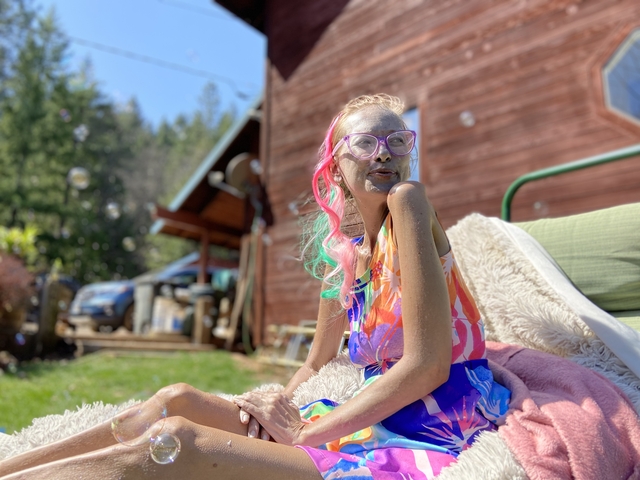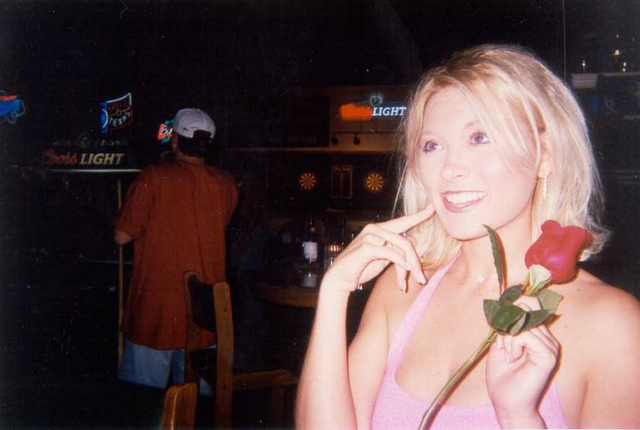For her first couple decades on Earth, Amy Carlson lived a pretty typical Gen X life. Born in McPherson, Kan. in 1975, the first child of parents who divorced when she was seven, she was a good student and a loving sibling to little sister Tara. “Amy had dreams,” her mom Linda recalls in the HBO documentary Love Has Won: The Cult of Mother God. “She wanted to go somewhere. She wanted to be somebody.” But Carlson didn’t come from money. Her ambitions got channeled into climbing the corporate ladder at McDonald’s. One day, she tried ecstasy and realized how empty her quotidian existence had become. She knew she had to change her life.
Another young woman might have picked up a guitar or a paintbrush or started an Etsy shop. Carlson got into New Age spirituality, rechristened herself “Mother God,” and became a de facto cult leader, presiding over a household of around 20 followers. Then she died, in the spring of 2021. Police eventually found her body—emaciated, mummified, adorned with glitter makeup, and strewn with Christmas lights—in what was once her bedroom. Her disciples had been awaiting her resurrection. Love Has Won, a three-part series from director Hannah Olson (Baby God) that premieres Nov. 13, tells the sad, weird story of Carlson and her Love Has Won community. Deeply reported, surprisingly empathetic, and revealing, if not always as insightful as you’d hope, the documentary captures the appeal of cults in a lonely, spiritually bereft world.

Like so many bizarre 21st century sects, from NXIVM to the DayLife Army, Love Has Won existed in physical space but was a product of the internet. Carlson found a spiritual community through the message boards on Lightworkers.org, which describes itself as “a transformative online platform for individuals seeking spiritual growth, healing, and enlightenment,” in the mid-2000s. There she met Amerith White Eagle, who became the first of many “Father Gods” to her divine feminine. “My current life situation is living in a world of illusion,” she confessed to him in one post. Soon they were together. “The way I look at it, everybody’s God,” White Eagle, an older man with a fuzzy white beard, explains to Olson. “We would talk about ascension, stepping out of the programmed world, attaining a higher vibrational consciousness. We were trying to bring this heaven on Earth, where everybody could be part of it—like a family.”
But Carlson didn’t just want a soulmate or an equal. She wanted a platform. She wanted followers. She came to believe that, as White Eagle puts it, “she was more God than other people were God.” The couple started a website called The Galactic Free Press, where they wrote and vlogged about their beliefs. Mother God became a rabbit hole you could fall down, after passing through conspiracy theories about 9/11, UFOs, the global banking system. By the early 2010s, White Eagle had been sidelined in favor of Father Gods more amenable to Carlson’s delusions of grandeur. A few years later, she assembled a bigger live-in community made up largely of attractive young adults afflicted with spiritual hunger. They earned a living by selling crystals, T-shirts, healing sessions, and the dangerous pseudo-panacea colloidal silver.

Because the internet provided a platform for the group to both make money and conduct outreach, Love Has Won benefits from a massive, effectively edited archive of livestream footage and other video that captures the daily lives of Carlson, her Father Gods, and the rest of the community. We get to see Mother God at her most charismatic and beatific, as well as in moments of sadness, frustration, and rage; armchair psychological diagnosis can be hard to resist. Carlson’s excessive drinking and restricted diet take a toll on her outward appearance over time, as well, heralding the long, slow, seemingly avoidable slide into death. Meanwhile, Olson interviews followers whose belief that Carlson was a physical manifestation of God kept them from intervening when it would have been obvious to anyone else that she was critically ill. Despite her failure to resurrect, many continue to walk the path she set out for them.
While cult docs often feel derisive or exploitative, Love Has Won plays like a tragedy. It would be easy to mock many aspects of Carlson’s belief system—the most prominent figure in the divine pantheon of celebrities and historical figures with whom Mother God claimed to communicate was Robin Williams—but, mostly to her credit, Olson’s primary lens is empathy. Sometimes, to the series’ detriment, this stops her from probing the most troubling details, including an affinity between Love Has Won and QAnon’s proclamation of a Trump-catalyzed Great Awakening. “As far as Hitler working for the light, I will tell you, everybody has been working for the light,” Carlson says in a snippet of audio that is left uncontextualized.

More outside perspectives would have brought some much-needed grounding to this saga. Still, in sticking close to Carlson’s family and Love Has Won’s inner circle, Olson achieves something that has proven impossible for documentarians telling the stories of cults—NXIVM, the Manson Family, and now Twin Flames Universe—that caused more profound, widespread damage: she makes the appeal of Mother God’s largely unhinged worldview legible. Many of her followers’ backstories include poverty, abuse, addiction, or just lack of opportunity; one explains how graduating high school amid the 2008 recession exposed the trappings of material success as an illusion. Carlson shared those experiences. And some of the ideas she synthesized from them were startlingly rational. “Too many have too little, and too few have too much,” she says in one video. “The federal government is owned by the people, not by the corporations.”
Like the true-crime genre with which they overlap, cult stories are usually packaged and consumed as freak shows or fright fests. One look at Carlson’s lifeless, blue-tinged body in the police footage that opens Love Has Won suggests how easily this series could have fit that mold. A better reason to pay attention to cults, which are generally conceived as alternatives to an inferior mainstream, is that they tell us so much about how the society we inhabit is broken. Carlson’s fate remains haunting because, regardless of her megalomania or her likely mental illness or her conspiracy theories, she identified and tried, in her own delusional way, to fill a yawning void at the heart of contemporary American life. The prescription she offered her followers turned out, sometimes literally, to be poison. But the diagnosis isn't so easy to dismiss.
More Must-Reads from TIME
- Caitlin Clark Is TIME's 2024 Athlete of the Year
- Where Trump 2.0 Will Differ From 1.0
- Is Intermittent Fasting Good or Bad for You?
- The 100 Must-Read Books of 2024
- Column: If Optimism Feels Ridiculous Now, Try Hope
- The Future of Climate Action Is Trade Policy
- FX’s Say Nothing Is the Must-Watch Political Thriller of 2024
- Merle Bombardieri Is Helping People Make the Baby Decision
Contact us at letters@time.com